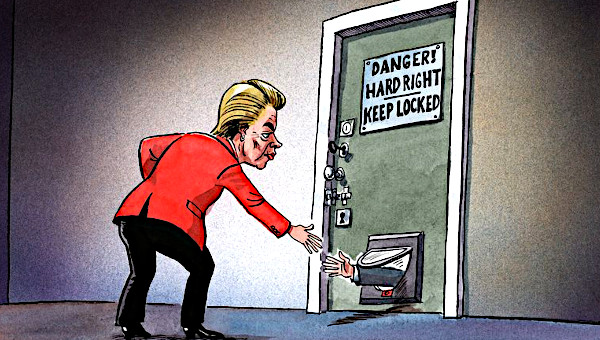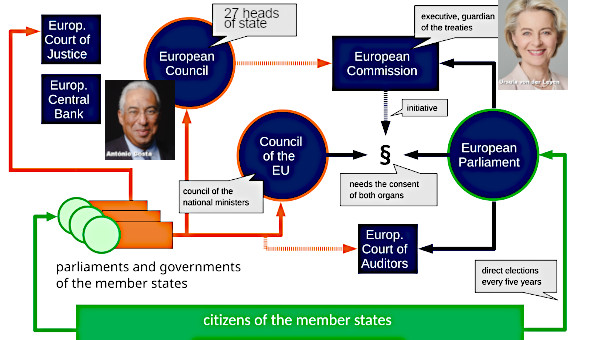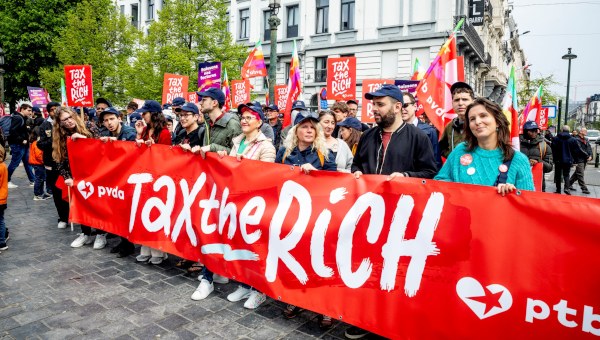Macron, Merz, and Starmer: The rearguard of liberal democracy
Large parts of the world are ruled by autocrats. Vladimir Putin is the worst of them all, Xi Jinping is not much better, and even America, the bastion of freedom, has fallen into the hands of a would-be king. Only Europe, inhabited by indomitable democrats, resists autocracy, led by the heads of state and government of Germany, France, and Great Britain.
This is roughly how one could summarize the self-image that resonates in the speeches and interviews of Emmanuel Macron, Friedrich Merz, and Keir Starmer. What democratic resistance needs, in their view, is weapons and competitiveness. Weapons require money; competitiveness requires sound public finances. What constitutes sound public finances is determined by the financial markets. Debt for weapons and investment incentives – that is, tax cuts for corporations and wealthy households – increases the demand for government bonds. This creates “good debt.”
Taxes and debt to finance public services and social benefits decrease demand, as they lead to “bad debt.” When the demand for government bonds falls, interest rates, or rather the government’s financing costs, rise. If spending financed with bad debt is reduced, a budget crisis can be averted. By bowing to the political preferences of the financial markets, governments can preserve their solvency, even if this conflicts with the preferences of their electorate.

From Market Populism to Culturalism
Macron and Starmer may well know that the reform programs of their predecessors, François Mitterrand and James Callaghan, respectively, drew the ire of the financial world. After massive sales of government bonds, rising interest rates, and capital flight, they abandoned their programs. They alienated their electorate but managed to “calm” the markets, as the financial jargon goes. Callaghan had to relinquish his position to Margaret Thatcher in 1979. Mitterrand lost his communist coalition partner and appointed his socialist party colleague Fabius as prime minister, or rather, austerity commissioner.
Unlike today, back then it was still possible to win elections with the promise that prosperity would follow the austerity period. This had already changed in Gerhard Schröder’s time. After two years of recession, triggered by an investment strike by industrial capital, Schröder shifted from the minimal reformism of the red-green coalition to a policy of austerity. Agenda 2010 may have cost him his job, but it led to increased investment and profits. The Agenda also deepened the gap between upper and lower incomes – as well as the gap between those in power, as the political arm of capital, and the electorate.
This alienation between those in power and the people also plagues Macron, Merz, and Starmer. They firmly believe that social reform programs are incompatible with what Angela Merkel, with refreshing frankness, termed a “market-conforming democracy.” And they are likely aware that no one believes in prosperity after austerity anymore. Their problem: disillusionment with the broken promises of prosperity propagated by the market populism championed by Thatcher and Reagan has given impetus to a new right wing, which unsettles them.
The nationalist rhetoric of the new right sounds too much like national socialism to their ears, like a rejection of the rationality of markets that line the pockets of the rich. This doesn’t stop them, however, from pandering to the right on the issue of migration. But Macron and his ilk are slowly learning to appreciate the aggressive nationalism and racism of the new right – as ideological raw material for constructing enemy images, without which one cannot go to war.
The restoration of a social consensus through redistribution is thwarted by the contradictions of the financial markets. Macron and his collaborators, however, know that even a market society needs consensus. They are attempting to forge this consensus in the name of the nation, liberalism, and democracy – in short, “Western values.” The result is a culturalist alternative to the bio-racism of the new right.
The Subordination of Europe
The ideology of imperial universalism accompanied the wars against Iraq and Afghanistan. After both led to protracted civil wars instead of the takeover by “Western-friendly” regimes, and after the collapse of the American real estate and stock markets plunged the global economy into crisis, the shift occurred from the US-led universalization of Western ideas and business practices to the fight against the perceived threat of autocratic superpowers.
This shift also alters the balance of power within the West. The American demand that Europe finally rearm so that the Americans, relieved of pressure on the European-Russian front, can concentrate fully on the fight against China, poses a problem for Europeans.

America First makes it unequivocally clear that Europeans are not partners in the Western alliance but rather vassals of US imperialism. Macron & Co. attempt to conceal this by portraying themselves as the last bastion of liberal democracy.
However, the American demand for European rearmament also exacerbates economic problems. The global economic crisis and the COVID-19 recession have caused government debt to skyrocket worldwide. The pandemic also raised hopes that the subjugation of government spending to the dictates of the financial markets would end, and that people would finally take precedence over profits. Large corporations, however, successfully countered these hopes, using the post-lockdown recovery to implement massive price increases.
The Russian invasion of Ukraine and the subsequent shift of energy demand from Russia to the United States not only fulfilled long-standing desires of American energy companies but also led to further price hikes, as oil and gas production in the US is significantly more expensive than in Russia. These increased energy costs were passed on to consumers, with an additional markup.
Higher prices mean lower real wages. Hopes for an economy no longer driven by profit maximization proved to be misplaced. Inflation also became a mandate for governments to reduce their debt. The central banks participated in passing on this mandate: to combat inflation, they raised interest rates and thus the government’s financing costs.
This put austerity, which had been suspended to manage the global financial and COVID-19 crises, back on the agenda. The financial markets sent a clear signal: if government debt was not reduced, a fiscal crisis would have to be triggered through the sale of government bonds, and the respective governments would have to be brought into line.
The Return of Austerity
This would be particularly at the expense of the poor, and has already severely shaken people’s trust in governments as neutral mediators between rich and poor. Now, those in power must also justify rising military spending, explaining why money is available for the military threat to other nations but none for alleviating the suffering of their own people. Macron has already gone through five prime ministers in this endeavor. The last, Sébastien Lecornu, was in office for less than four weeks.
With Macron’s failure looming, Starmer has put his austerity plans on hold for the time being. This, however, has caused “nervousness” in the government bond markets. Merz has so far been spared this, although he has been wavering between announcing “tough reforms” and attempting to negotiate amicable, somewhat less stringent reforms with his Social Democratic coalition partner.
Merz’s hesitation also reflects internal power struggles within the CDU/CSU alliance, between those who cling to the self-image of defenders of liberal democracy and those who want to try their luck with Alice Weidel. Before Trump’s return to the White House, defenders of liberal democracy bet that the financial markets would punish fiscal laxity and foreign trade protectionism. They were wrong.
The markets get along well with the new right. They will punish European heads of state and government who fail to meet their austerity targets. Efforts to avoid this punishment through austerity measures only play into the hands of the new right.
Macron, Merz, and Starmer are not defenders of liberal democracy but rather of its rearguard. If democracy is to have a future, liberalism must be freed from the clutches of the markets and reconciled with the idea of social democracy.
The political forces that attempted this reconciliation within the framework of capitalist relations of production have defected to the camp of austerity commissioners. Macron left the Socialist Party years ago. Starmer and Merz’s Finance Minister Klingbeil are following in the footsteps of Blair and Schröder. There are, at this time, no significant forces for building a democracy beyond capitalist relations of production. •

This article first published in German on the Sozialistische Zeitung website.





